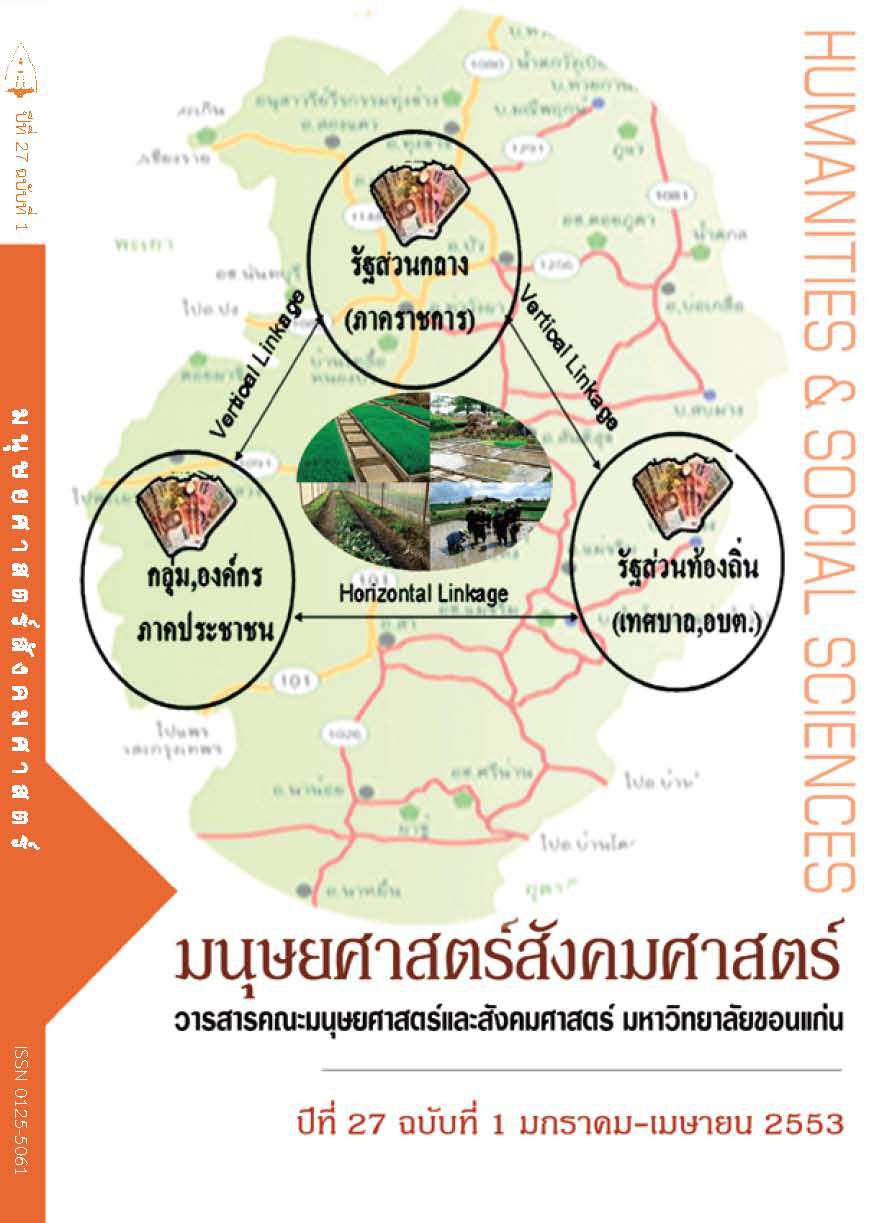วิถีชีวิตแรงงานไทยในไต้หวัน : การศึกษาในถิ่นปลายทาง
Keywords:
วิถีชีวิต, แรงงานไทย, ไต้หวัน, ถิ่นปลายทาง, Livelihoods, Thai worker, Taiwan, DestinationAbstract
บทคัดย่อ
การวิจัยนี้มีวัตถุประสงค์เพื่อศึกษา 1) ขั้นตอนกระบวนการการติดต่อไปทำงานในไต้หวันของแรงงานไทย 2) สภาพความเป็นอยู่และสภาพการใช้ชีวิตเป็นแรงงานย้ายถิ่นของแรงงานไทยที่ทำงานในไต้หวัน โดยใช้การวิจัยเชิงคุณภาพ ด้วยการสัมภาษณ์เชิงลึกตามแนวทางการสัมภาษณ์กับแรงงาน 36 ราย และผู้รู้ 5 ราย และใช้การประชุมกลุ่มกับล่าม เก็บข้อมูลในเดือนเมษายน-มิถุนายน 2551 วิเคราะห์ข้อมูลด้วยเทคนิคการวิเคราะห์เนื้อหา เพื่อหาข้อสรุปเชิงอุปนัย (Inductive Analytic) ผลการวิจัยพบว่า แรงงานที่ร่วมกิจกรรม ย้ายถิ่นไปทำงานที่ไต้หวันส่วนใหญ่เป็นชาย จบการศึกษาประถมศึกษา-มัธยมศึกษาตอนปลาย ทำให้แรงงานบางส่วนศึกษาต่อการศึกษานอกโรงเรียน และปริญญาตรี แรงงานส่วนมากมาจากภาคอีสาน มีบางส่วนหนึ่งมาจากแถบภาคเหนือ และมีส่วนน้อยที่เป็นแรงงานมาจากภาคกลาง และตะวันออก ส่วนมากอยู่ในวัยระหว่าง 20-34 ปี สมรสแล้วเป็นส่วนใหญ่ บางคู่ย้ายถิ่นมากับคู่สมรสแม้ว่าแรงงานหญิงจะไม่ได้รับอนุญาตให้เข้ามาทำงานก็ตาม แรงงานส่วนมากทำงานโรงงาน โดยติดต่อมาทำงานผ่านสาย และเครือญาติเพราะเชื่อมั่นว่าจะทำให้มาได้เร็ว ติดต่อมาทำงานโดยตรงกับนายจ้าง และผ่านกระบวนการสมรสอำพราง การมาทำงานของแรงานมิได้มีการเตรียมตัวด้านความพร้อมเกี่ยวกับแหล่งช่วยเหลือเมื่อตกทุกข์ได้ยากแต่อย่างใด มีเพียงการแสวงหาแหล่งเงินทุนเพื่อใช้ในการติดต่อมาทำงาน วิถีชีวิตแรงงานไทยปัจจุบัน แม้ว่าแรงงานบางส่วนพยายามทำงานหนักเพื่อสร้างรายได้ เพื่อให้สามารถส่งเงินกลับมาให้ทางบ้าน แต่ยังถูกเอาเปรียบในการจ้างงาน ขณะเดียวกันแรงงานก็ใช้ชีวิตที่มีความเสี่ยงเรื่องสิ่งเสพติด สุรา อันทำมาสู่การวิวาทและความเสี่ยงเรื่องเพศ และนำมาสู่การหนีสัญญาจ้าง ทำให้การย้ายถิ่นมาทำงานต่างประเทศไม่ประสบความสำเร็จนัก
คำสำคัญ : วิถีชีวิต, แรงงานไทย, ไต้หวัน, ถิ่นปลายทาง
Abstract
The objective of this study are to examine 1) process that Thai labourers apply to work in Taiwan and 2) livelihoods of labour who come to work in Taiwan. Qualitative methods were employed to obtain the required data. The target groups of this study include 36 Thai labourers and interpreters who work with Thai labourers; and 5 key informants. These target groups were interviewed with in-depth interview guide, group discussion and observation between April and June 2008. The obtained data was analyzed with content analysis and inductive analytical technique. This study found that most Thai workers who migrated to work in Taiwan are male. They obtained education of primary and upper-secondary level. Some of them continued their study through informal education up to under graduate level. Most of these workers are from the Northeast of Thailand, some are from the North and a fewer numbers are from Central and the East of Thailand. The workers are aged between 20 – 30 years old, greater numbers of them were married. Some of their couples are accompanied them albeit by law female workers not allowed. Most of the workers are working in the factories. They sought these jobs through labour agencies and their relatives as they believe that this would help them to obtain jobs in Taiwan faster. Some of them made a direct contact with employees or through fake marriage. These workers did not prepare for the sources of help when they encounter difficulties. They prepared only finance for seeking jobs. In respect with the present livelihoods of workers, it was found that these workers are working hard in order to gain higher income and increase remittance. But these workers are treated unfair and exploited. Meanwhile some of these workers have involved in drug and alcohol that could lead to violence, risks of sex-related behaviors and avoidance of the contract. In these cases their migration to overseas are doom to fail.
Keywords : Livelihoods, Thai worker, Taiwan, Destination


